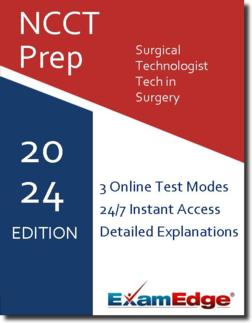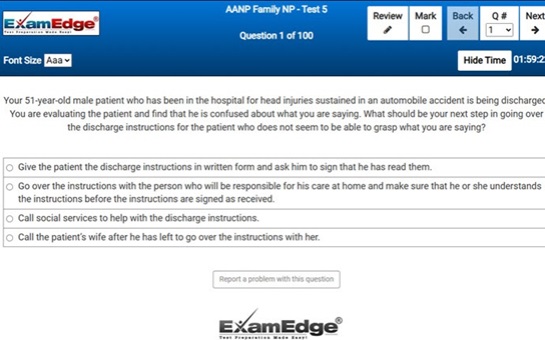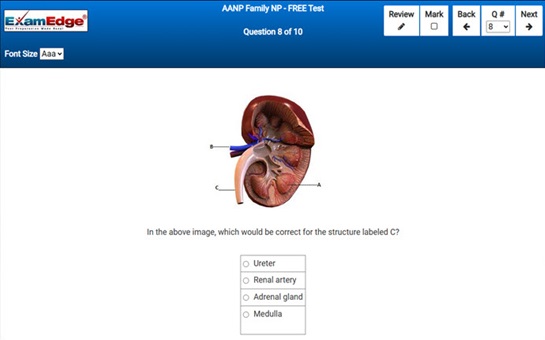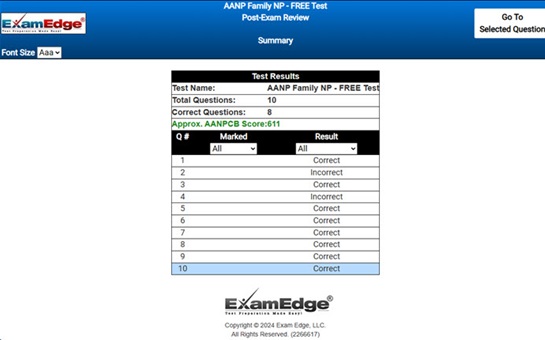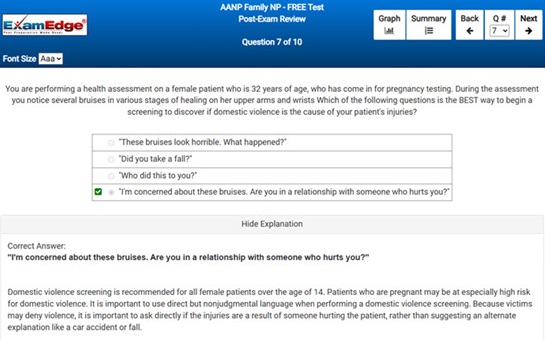NCCT Surgical Technologist - Tech in Surgery (TS-C) Practice Tests & Test Prep by Exam Edge - FAQ
Get Instant Online Access Now!
** Sample images, content may not apply to your exam **
Looking for more information about the exam? Check out our NCCT Surgical Technologist FAQs
Our practice tests are designed to help you master both the subject matter and the art of test-taking. Created to mimic the real exam, our practice tests feature:
- Instant access to your online practice tests - available 24/7
- Timed, untimed, and "study guide" modes
- Detailed explanations for each question
- 20 online practice exams - That's 2,000 unique questions
Review the information below and if you have any additional questions about NCCT Surgical Technologist - Tech in Surgery practice tests that have not been answered here, Click her to contact Exam Edge Support.
Select Your Test Bundle
Excellent
NCCT Surgical Technologist - Tech in Surgery (TS-C) Shortcuts
General Exam Info
Exam Topics
Features
Study Plan Tips
Test Reviews
Why Exam Edge?
FAQ
Related Blogs
Take a FREE Test
Why should I use Exam Edge to prepare for the NCCT Surgical Technologist Exam?
FAQ's for Exam Edge NCCT Surgical Technologist practice tests
We have ten great reasons why Exam Edge is the #1 source on the internet when it comes to preparing for NCCT Surgical Technologist test:
- Comprehensive content: Exam Edge's NCCT Surgical Technologist practice tests are created specifically to prepare you for the real exam. All our NCCT Surgical Technologist - Tech in Surgery practice test questions parallel the topics covered on the real test. The topics themselves are covered in the same proportions as the real test too, based on outlines provided by the National Center for Competency Testing in their NCCT Surgical Technologist - Tech in Surgery test guidelines.
- Realistic practice: Our NCCT Surgical Technologist - Tech in Surgery practice exams are designed to help familiarize you with the real test. With the same time limits as the real exam, our practice tests enable you to practice your pacing and time management ahead of test day.
- Detailed explanations: As you complete your practice tests, we show you which questions you answered correctly and which ones you answered incorrectly, in addition to providing you with detailed step-by-step explanations for every single NCCT Surgical Technologist practice exam question.
- Performance insights: After you complete a practice test, we provide you with your raw score (how many you answered correctly) and our estimate of the NCCT Surgical Technologist - Tech in Surgery score you would have received if you had taken the real test.
- Ease of access: Because all our practice tests are web-based, there is no software to install. You can take NCCT Surgical Technologist - Tech in Surgery practice exams on any device with access to the internet, at any time.
- Flexible use: If you must pause while taking one of our practice tests, you can continue right where you left off. When you continue the test, you will start exactly where you were, and with the same amount of time you had remaining.
- Thousands of unique questions: We offer 20 different online practice exams with 2,000 unique questions to help you prepare for your NCCT Surgical Technologist !
- Low cost: The cost of ordering 5 practice tests is less than the cost of taking the real NCCT Surgical Technologist - Tech in Surgery test. In other words, it would be less expensive to order 5 practice tests than to retake the real NCCT Surgical Technologist exam!
- Our trusted reputation: As a fully accredited member of the Better Business Bureau, we uphold the highest level of business standards. You can rest assured that we maintain all of the BBB Standards for Trust.
- Additional support: If you need additional help, we offer specialized tutoring. Our tutors are trained to help prepare you for success on the NCCT Surgical Technologist exam.
What score do I need to pass the NCCT Surgical Technologist - Tech in Surgery Exam?
To pass the NCCT Surgical Technologist test you need a score of .
The range of possible scores is 0 to 100.
How do I know the practice tests are reflective of the actual NCCT Surgical Technologist ?
At Exam Edge, we are proud to invest time and effort to make sure that our practice tests are as realistic as possible. Our practice tests help you prepare by replicating key qualities of the real test, including:
- The topics covered
- The level of difficulty
- The maximum time-limit
- The look and feel of navigating the exam
Do you offer practice tests for other National Center for Competency Testing subjects?
Yes! We offer practice tests for 7 different exam subjects, and there are 115 unique exams utilizing 11500 practice exam questions. Every subject has a free sample practice test you can try too!
NCCT ECG Technician
(NCET
®
)
Practice Tests
NCCT Medical Assistant Certification (NCMA)
Practice Tests
NCCT National Certified Phlebotomy Technician (NCPT)
Practice Tests
NCCT National Insurance and Coding Specialist (NCICS)
Practice Tests
NCCT National Medical Office Assistant Certification (NCMOA)
Practice Tests
NCCT National Patient Care Technician (NCPCT)
Practice Tests
NCCT Surgical Technologist
(TS-C
®
)
Practice Tests
To order tests, or take a sample test, for a different subject:
Click on ' Name on the Exam Name' You will be take to the orders page
How do I register for the real National Center for Competency Testing?
For up-to-date information about registration for the National Center for Competency Testing, refer to the National Center for Competency Testing website.
NCCT Surgical Technologist - FAQ Sample Questions
|
|
|
|

